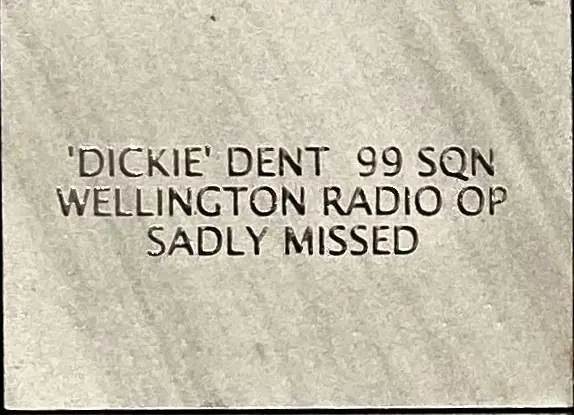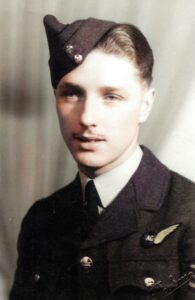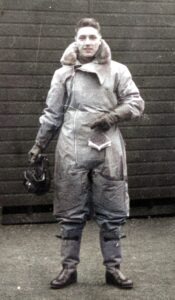
Miles Richard “Dickie” Dent 2/11/1920 -16/6/2002 (father of Elizabeth Gibbon)
Royal Air Force, 99 Squadron (Bomber Command)
Rank: Flight Sergeant, Service no. 1006733
Not yet 20 years old, Miles volunteered for the RAF at Padgate in early 1940 and later that year completed training as a wireless operator/air gunner.
In April 1941, he joined 99 Squadron at Waterbeach in Cambridgeshire. His first sortie was a raid on Boulogne on the night of 12-13 August when he flew in Wellington X9761.
A few days later, on 16-17 August, as part of the Wellington crew “J for Johnny” he was severely injured on a night bombing raid over Duisburg, when his Wellington Bomber (R1293) was caught in search lights and attacked by a German night fighter. The whole fuselage was ripped open and the undercarriage shot away. Miles’ crewmate, John Bubb was also badly injured in the fighter attack. At this point, the plane went into a steep dive and Dickie thought all the crew had been killed and the end was nigh. The dive, however, was the pilot’s evasive action to escape the searchlights. The Wimpey headed for home. The intense cold at altitude stemmed the blood flow and stopped Dickie from bleeding to death. Miraculously, without wireless or proper navigational aids, the plane crossed the white cliffs to England. The pilot (Sgt Coleman) nursed the badly damaged plane home, crash landing at Ford aerodrome near Southampton. The four un-injured crewmen (Sgts Coleman, Clark, Paxton and Derbyshire) were all killed on their next sortie.
They were cut out of the fuselage by ground crew and, as he waited for medical help on the ground, Dickie recalled how sweet the airfield grass smelled. As he drifted into unconsciousness they thought he was dead until a doctor detected a pulse then they fought to keep him alive and he was taken to Goodwood House which had been equipped as a military hospital. From that point it was an uphill battle for Dickie against appalling abdominal wounds and he was in hospital for over a year. During that time, he was moved to Midhurst sanitorium (also equipped for injured servicemen) first to battle peritonitis and then for more abdominal surgery. There were dark lesions appearing on his skin. The surgeon found that these were pieces of material from his aircrew uniform which had been blasted into his abdominal cavity and were making their way to the surface. More incredibly, the surgeon also found pieces of metal which turned out to be parts of a pair of pliers which Dickie had in his pocket during the attack. The surgeon told him the pliers had protected his abdomen from even more damage and had shielded his major organs from serious injury which undoubtedly helped his survival. The surgeon henceforth referred to him as his miraculous “pliers” case.
In 1942, after medical discharge, Dickie returned to Waterbeach and discovered his old squadron was on overseas service. He also learned that many of his old squadron had been lost on missions. He was unable to return to active service owing to his still precarious medical condition as a result of his grievous injuries. He returned home to Preston in Lancashire and went into local government working for Preston Corporation then Preston Borough Council. Fittingly, he maintained his link with the RAF by helping Air Training Corps Cadets, teaching them wireless procedure and Morse code.
The happy conclusion to this story is that Dickie met his wife, Dorothy, in the local government offices and they were married in October 1947. They had a daughter, Elizabeth, (me!) in March 1953. In early 1978, by chance, Dickie heard on the radio that there was to be a reunion of Squadron 99 at Newmarket racecourse. Dickie contacted the organiser, Norman Didwell, (ex squadron 99) and was put in touch with his injured crewmate, John Bubb, then living in Bristol. Airmen came from as far away as Canada and New Zealand to attend. For Dickie and John it was an emotional but joyful reunion. It was a wonderful day. Norman also arranged for Dickie to receive the medals he was due – the 1939-45 Star, the 39-45 War Medal and his much-cherished Aircrew Europe Medal.
These airmen were modest, dutiful people. For me they were courageous heroes. I am immensely proud of my dad and all those like him who served their country with honour. Thank you.

